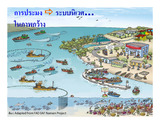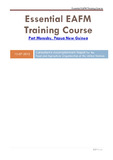| dc.description | The FAO GEF Project REBYC II CTI is one of the FAO projects along with other support agencies that had been promoting capacity development for the Ecosystem Approach to Fisheries Management through the “Essential EAFM” training. Hundreds of middle level managers were trained in Asia and a cadre of trainers was also trained. Realizing the importance of sensitizing the Leaders, Executives and Decision makers (LEAD) on the EAFM concept, different short modules on EAFM LEAD were developed. SEAFDEC plays an important role in this regard. Following three successful EAFM LEAD workshops in Vietnam and the Philippines the next important step is to sensitize the Program Committee Member of SEAFDEC member countries. During the 39th Meeting of the SEAFDEC Program Committee Meeting (PCM), in Indonesia, on 28-30 November 2016, a one-hour High-level Reception (HLR), to provide information for Leaders, Executives and Decision-makers(LEADers) to better understand and support EAFM was organised with the aim to achieve sustainable fisheries in Southeast Asia. Following the opening and introductions, short sessions were held covering an overview of EAFM - the ‘what and why’ of EAFM, SEAFDEC activities on the promotion of EAFM, an introduction to E-EAFM and LEAD Materials and website, followed by a question and answer session. Appreciating the information received, participants requested SEAFDEC to further support member countries on the extension, implementation and practice of EAFM.
The need to apply an ecosystem approach to capture fisheries management is now globally accepted and has been endorsed in a number of international meetings and agreements. To support this initiative, the Food and Agriculture Organization (FAO), through its Bay of Bengal Large Marine Ecosystem (BOBLME) Project, the U.S. National Oceanic and Atmospheric Administration (NOAA), the Coral Triangle Initiative (CTI), IMA International and the South East Fisheries Development Centre (SEAFDEC), with technical assistance from several consultants, formed a consortium to develop an Essential Ecosystem to Fisheries Management (E-EAFM) training course. The Consortium was supported by a number of organizations, projects and donors. The course is designed for local and national level fishery and environment staff and equips trainees to plan more effectively, manage fisheries more holistically, and better resolve fisheries issues and challenges. Over the past two years, hundreds of middle managers and fisheries officers have been trained through 25-30 E-EAFM training courses across Asia. In addition, at least 57 EAFM Trainers have attended training of the trainers (TOT) courses and have the skills to using the E-EAFM curriculum. EAFM is now being implemented successfully in a number of fisheries throughout Asia.
However, many senior fisheries officers, involved in planning and policy making in the countries where EAFM is being established, have not been sensitized to the issues, nor introduced to the concepts involved. In this context, the REBYC II - CTI1 project organized events to develop the toolkit for LEAD i.e. EAFM for Leaders, Executives and Decision makers. The materials for EAFM LEAD were updated and completed in the September 2016. The LEAD EAFM sessions had been conducted as trials in Viet Nam and Philippines in October 2016. In the ASEAN-SEAFDEC Conference on Sustainable Fisheries for Food Security Towards 2020 “Fish for the People 2020: Adaptation to a Changing Environment”, Bangkok, Thailand, 16 June 2011, the Senior Officials adopted the Plan of Action on Sustainable Fisheries for Food Security for the ASEAN Region Towards 2020, to be used as a guideline to develop programs, projects and activities for the implementation of the Resolution. Resolution and Plan of Action recommended SEAFDEC to establish and implement comprehensive policies for an ecosystem approach to fisheries management through effective systems (i) to provide licenses to fish (boats, gear and people); (ii) for community fishing rights/rights-based fisheries; (iii) that provide for the development of supporting legal and institutional frameworks; (iv) encourage institutional cooperation; (v) that aid in streamlining co-management. In this regard, it is very important to organize an event to promote EAFM to senior fisheries officers in the 39th Meeting of the SEAFDEC Program Committee Meeting (PCM), organized in Indonesia, 28-30 November 2016. | en |




